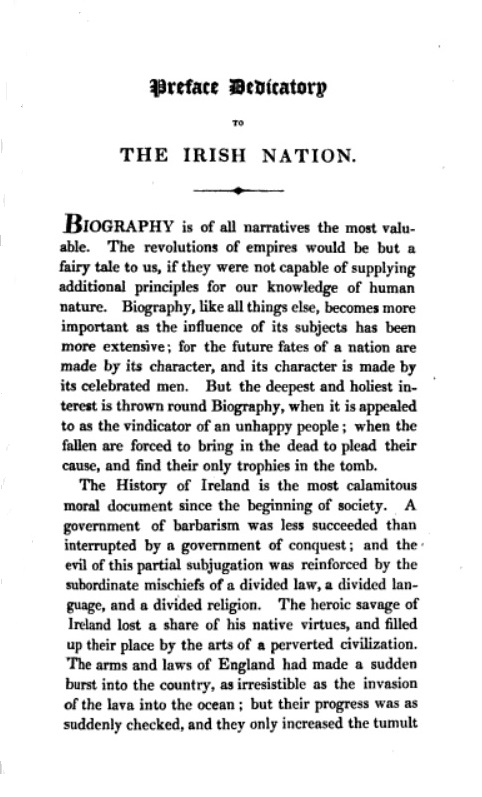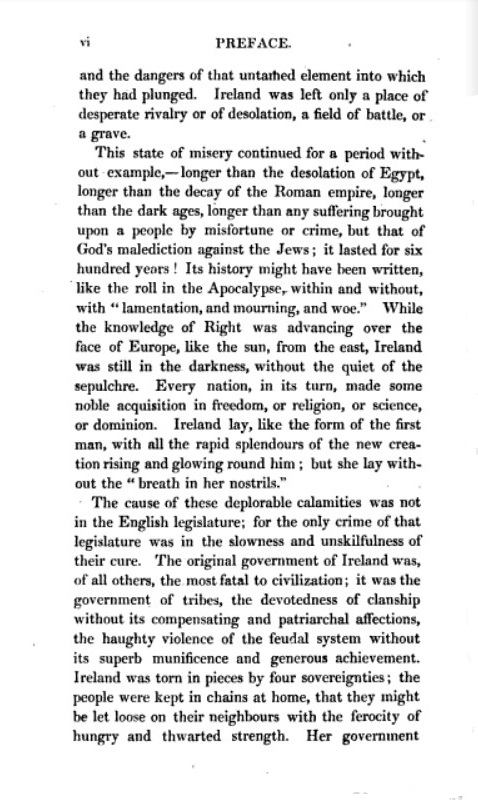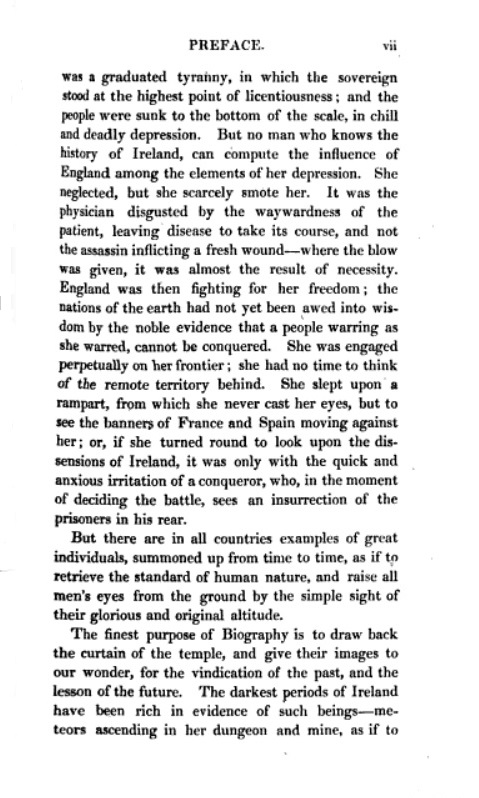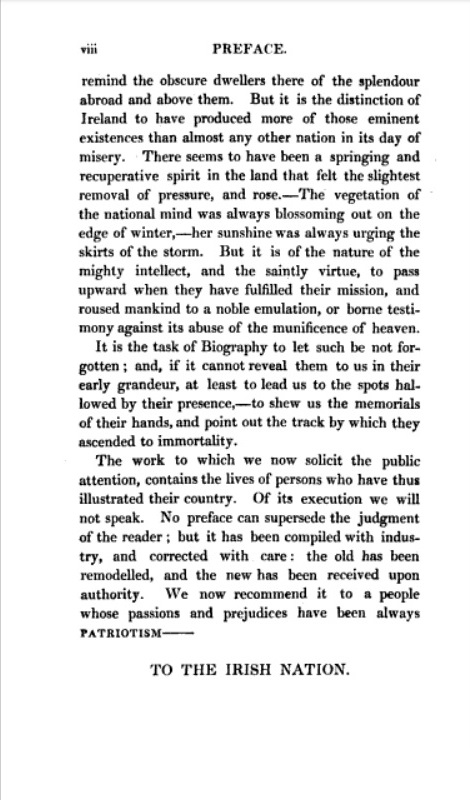|
Richard Ryan, Biographia Hibernica: A Biographical Dictionary of the Worthies of Ireland, 2 vols. (1819-21)
| Go to RICORSO Library > Criticism > History > Legacy - Richard Ryan - Index |
| Internet sources ... |
Biographia Hibernica, Vol. 1 (1819) available at Google Books - online; accessed 05.07.2023]; Internet Archive - online.
Biographia Hibernica, Vol. II (1821) available at Internet Archive - online; another edn. (1822) Wisconsin Univ. Library - online. |
| See also copies in RICORSO > Library > Criticism [...] Legacy > Biographia Hibernica - Index |
|
| Bibliographical details: Richard Ryan, Biographia Hibernica: A Biographical Dictionary of the Worthies of Ireland, from the earliest period to the present time. Written and compiled by Richard Ryan in two volumes / Printed for Sherwood, Neely & Jones, Paternoster Row [London]; M. N. Mahon; R. Milliken; and Hodges & MacArthur / Dublin 1822. Printed by J. Brettell, Rupert Street, Haymarket, London. The Epigraph printed on the title page is the second stanza of Moore’s song, “Let Erin Remember the Days of Old” - thus: |
“On Lough Neagh’s bank, as the fisherman strays / In the calm, cold eve’s declining, / He sees the Round Towers of other days / In the wave beneath him shining. / Thus shall memory often, in dreams sublime, / Catch a glimpse of the days that are over; / Thus, sighing, look through the waves of time / For the long-faded glories they cover.” |
| Note: the first edition (1821) and also the second (1822) - but the 1819 edition has a ‘Preface Dedicatory to the Irish Nation“ which was revived in the 1822 (3rd edn.) and omitted from the 1821 edition. A peculiarity of the 1821 edition is the fact that a page containing part of the entries on Common Cormac (of “Blind Cormac”) and Philip Cosby (admiral) is printed as both p.22 - thought styled 20 yet following 21 and followed by 22. The header “Cosby” is likewise carried over throughout the Cormac article on pp.21, 20, 23-27 - where the ensuing entry on the giant Patrick Cotter begins. |
| |
| Ed. Note: The Internet Archive copy text of the 1821 edition of Vol. II includes all the above details but with a different name for the London bookseller - viz., John Warren, Old Bond St. in lieu of Sherwood et al. (as supra.) The opening entry on Matthew Concanen is produced as on the right hand (recto) at the first page-turn of the text proper and produced again on the left (verso) in seven pages after, where the numeration also restarts at p.1. In the interim have appeared two blank pages, two pages on Concanen, a page beginning on Dr. Bernard Connor, two more blank pages, and a repeat of the Concanen page with a short title of the "Biographical Dictionary" at the head, occupying half a page at the head. There are no indications that this disorder in the pages is the product of the photographical copy - nor that it simply involves the mistaken binding of pages in the original since the left-right arrangement of the pages precludes such an interpretation. It therefore appears that the book was erroneously printed in this manner. In view of the blotchy printing, the page-contents have eluded the best efforts of the OCR program associated with the scanner and the html text is consequently laden with typographical errors to the degree that a digital edition based on it would be beyond the scope of any ordinary editor. I have therefore packaged it with all its faults upon it, hoping that browsing and searching value will make up for its deficit in proper appearance. [BS Jan. 2024.] |
| |
| Preface Dedicatory to the Irish Nation (1819 & 1822 Edns.) |
| Note: The Dedicatory Preface was omitted from the 1821 edition and restored in the edition of 1822 Edition |
Biography is of all narratives the most valuable. The revolution of empires would be but a fairy tale to us, if they were not capable of supplying additional principles for our knowledge of human nature. Biography, like all things else, becomes more impoarant as the influence of its subjects has been more extensive; for the future fares of a nation are made by its character, and its character is made by its celebrated me. But the deepest and holiest interest is thrown round Biography, when it is appealed to as the vindicator of an unhappy people; when the fallen are forced to bring in the dead to plead their cause, and find their only trophies in the tomb.
The History of Ireland is the most calamitous moral document since the beginning of society. A goverment of barbarism was less succeeded than interrupted by a government of conquest; and the evil of this partial subjugation was reinforced by the subordinate mischiefs of a divided law, a divided language, and divided religions. The heroic savage of Ireland lost a share of his native virtues and filled up their place by the arts of a perverted civilisation. The laws of English had made a sudden burst into the country ... but their progress was as suddenly checked, and they only increased the tumult and dangers of that untamed element into which they had plunged. Ireland was left only a place of desperate rivalry or of desolation, a field of battle or a grave.
The cause of these deplorable calamities was not in the English legislature; for the only crime of that legislature was in the slowness and unskillfulness of the cure. The original government of Ireland was, of all others, the most fatal to civilisation; it was the government of tribes, the devotedness of clanship without its compensating and patriarchal affections, the haughty violence of the feudal system without its superb munificence and generous achievement. Ireland was torn in pieces by four sovereignties; the people were kept in chains at home, that they might be loosed on their neighbours with the ferocity of hungry and thwarted strength. Her government was a graduated tyranny in which the sovereign stood at the highest point of licentiousness; and the people were sunk to the bottom of the scale in chill and deadly depression. But no man who knows the history of Ireland can compute the influence of England among the elements of her depression. She neglected, but she scarcely smote her. It was the physiciants disgusted by the waywardness of the patient, leaving the disease to take its course, and not the assassin inflicting a fresh wound. ... England was then fighting for her freedom [against] France ... Spain ... if she turned round to look upon the dissensions of Ireland, it was only with the quick and anxious irritation of a conqueror, who in the moment of deciding the battle, sees an insurrection of prisoners in the rear.
[...; see further - infra]
|
See Preface in full with page images - as infra; full-text copies available in RICORSO Library > Criticism - as html, docx, pdf and txt.) The text is also available at Google - online [accessed 02.07.2023].
|
| |
| Index by Name of Persons (Vols. I & 2) |
| Contents [persons treated] |
| Vol. I: Abernethy, John [1]; Alexander, John [6]; Annesley, Arthur, Earl of Anglesey [9]; Arehdale, Mervyn [17]; Archdekin, Riehard [19]; Arthur, James [20] Ash, St. George [21]; Atkinson, Joseph [23]; Averill, John [24]; Aylmer, Matthew [25]; Aylmer, George [27]; Baillie, Captain William [25]; Barber, Mary [28]; Barnewall, Anthony [28]; Baro, or Baron, Bonaventura [29]; Barret, George [31]; Barrett, Dr. James [33]; Barrett, Captain John [84]; Barry, David Fitzjames, Viscount Buttevant [40]; Barry, David, first Earl of Barrymore [41]; Barry, James, Lord Santry [42]; Barry, Spranger [44]; Barry, James, Jr [68]; Bathet, William [74]; Beard, Thomas [75]; Beling, Richard [76]; Berkeley, George, Bishop of Cloyne [76]; Bermingham, Hon. John [96]; Bernard, Harriet Catherine, Countess of Bandon [97]; Bickerstaff, Isaac [99]; Birmingham, Sir John, Earl of Lough [100]; Black, Joseph [101]; Boirumhe, Brien [113]; Borlase, Edmund [122]; Boyd, Hughl Macauley [124]; Boyle, Richard [128]; Boyle, Roger [133]; Boyle, Francis, Viscount Shannon [162]; Boyle, Hon. Robert [163]; Boyle, Henrietta, Lady O’Neil [177]; Boyle, Roger [133]; Boyse, Samuel [179]; Brabazon, William, first Earl of Meath [197]; Brady, Nicholas [198]; Brereton, Lieut.Gen. [200]; Brigit, St. [200]; Brodriek, Allan, first Viscount Middleton [201]; Brooke, Henry [201]; Brooke, Charlotte [211]; Brooke, or Brookes, John [212]; Brouneker, Sir William, Viscount of Castle-Lyons [214]; Brown, Dr. Jemmet [215]; Browne, Peter [222]; Browne, Patrick [225]; Bunworth, Charles [228]; Burghs Walter Hussey [299]; Burke, Edward [sic] [231]; Burke, Richard [271]; Burke,Walter [272]; Burns, John [273]; Burrowes, Alexander Saunderson [274]; Butler, James, fourth Earl of Ormond [275]; Butler, Richard, third Viscount Mountgarret [278]; Butler, Thomas, Earl of Ossory [281]; Butler, James, Duke of Ormonde [286]; Butts, John [295]; Byrne, Charles [296]; Byrne, Charles [296; this line repeated in error]; Curran, John Philpot [298]; Caldwell, Sir James [363]; Caldwell, Hume [366]; Caldwell, Henry [374]; Caldwell, Charles [375]; Caldwell, Andrew [376]; Cantwell, Andrew [377]; Carleton, Sir Guy Lord Dorchester [377]; Carolan, Turlough [383]; Caron, Redmond [390]; Carter, Thomas [390]; Caulfield, William, second Viscount Charlemont [391]; Caulfield, James, Earl of Charlemont [392]; Centlivre, Sussanah [454]; Chandler, Edward [460]; Cherry, Andrew [462]; Chicester, Arthur, Earl of Donegal [467]; Clancy, Michael [469]; Clare, Benjamin [471]; Clayton, Robert, Bisbop of Clogher [471]; Cleaver, Mrs [478]; Cleiri, or Cleirigh, Michael [479]; Close, Sir Barry [480]; Coghill, Marmaduke [481]; Cole, Sir John [482]; Colgan, John [483]; Columbas, or Celumkille, St. [var. Columbanus [1821 Edn.]; 485]. |
| |
| Vol. II: Concanen, Matthew ; Conry, Maurice [Flaithrí Ó Maolchonaire]; Coote, Sir Charles; Coote, Sir Charles; Cox, Richard [Sir]; Curran, John Philpot; Daniel, William; Delacour, James [Rev.]; Delany, Patrick; Farquhar, George; Fitzgerald, Edward; Fleming, Patrick; Flood, Henry; Francis, Philip [Sir]; Gentleman, Francis; Goldsmith, Oliver; Grattan, Henry; Grierson, Constantia; Grimshaw, Nicholas; Haliday, William; Hamilton, Anthony; Hamilton, Elizabeth; Hamilton, William [Rev]; Hely-Hutchinson, John; Hiffernan, Paul; Hone, Nathaniel; Hutcheson, Francis; Jephson, Robert; Johnstone, Charles; Jones, Henry; Keating, Geoffrey; Kelly, Hugh; Keogh, John [d.1817]; King, William [Archbishop]; Kirwan, Richard; Langrishe, Hercules [Sir ]; Le Fanu, Alicia; Leland, Thomas; Lombard, Peter; Lucas, Charles; Macartney, George [Earl of] ; MacGeoghegan, Conall; Macklin, Charles; Malone, Edmund; Millikin, Richard Alfred; Molesworth, Robert; Molloy, Charles; Molyneux, William; Monk, Mrs.; Mossop, Henry; Mossop, William; Murphy, Arthur; Nary, Cornelius; O’Brien, William; O’Flaherty, Roderic[k]; O’Halloran, Sylvester; O’Hara, Kane; O’Leary, Arthur [Fr.]; Ormond, Duke of,; Parnell, Thomas; Patrick, St.; Pilon, Frederick; Pockridge, Richard; Roche, Boyle [Sir]; Sarsfield, Patrick; Sheridan, Frances; Sheridan, R[ichard] B[rinsley]; Thomas Sheridan; Skelton, Philip; Sloane, Hans; Southerne, Thomas; Sterne, Laurence; Swift, Jonathan; Synge, Edward [Archbishop]; Tate, Nahum; Touchet, James, Earl of Castlehaven; Tyrrel, Richard; Ussher, James; Wilk[e]s, Robert; Woffington, Peg; Harris, Walter [Addendum]. |
| —See table-form listing as attached.) |
|
Preface Dedicatory (1819 & 1822 Edns.)
| TO THE IRISH NATION. |
Biography is of all narratives the most valuable. The revolutions of empires would be but a fairy tale to us, if they were not capable of supplying additional principles for our knowledge of human nature. Biography, like all things else, becomes more important as the influence “of its subjects has been more extensive; for the future fates of a nation are made by its character, and its character is made by its celebrated men. But the deepest and holiest interest is thrown round Biography, when it is appealed to as the vindicator of an unhappy “people; when the fallen are forced to bring in the dead to plead their cause, and find their only trophies in the tomb.
The History of Ireland is the most calamitous moral document since the beginning of society. A government of barbarism was less succeeded than interrupted by a government of conquest; and the evil of this partial subjugation was reinforced: by the {iv} subordinate mischiefs of a divided law, a divided language, and a divided religion. The heroic savage of Ireland lost a share of his native virtues, and filled up their place by the arts of a perverted civilization. The arms and laws of England had made a sudden burst into the country, as irresistible as the invasion of the lava into the ocean; but their progress was as suddenly checked, and they only increased the tumult and the dangers of that untamed element into which they had plunged. Ireland was left only a place of desperate rivalry or of desolation, a field of battle, or
a grave.
This state of misery continued for a period without example,—longer than the desolation of Egypt, longer than the decay of the Roman empire, longer than the dark ages, longer than any suffering brought — upon a people by misfortune or crime, but that of God’s malediction against the Jews; it lasted for six hundred years! Its history might have been written, like “the roll in the Apocalypse, within and without, with “lamentation, and mourning, and woe.” While the knowledge of Right was advancing over the face of Europe, like the sun, from the: north, Ireland was still in the darkness, without the quiet of the sepulchre. Every nation, in its turn, made some noble acquisition in freedom, or religion, or science, or dominion. Ireland lay, like the form of the first man, with all the rapid splendours of the new creation rising and glowing round him’; but she lay without the “breath in her nostrils,” {v}
The cause of these deplorable calamities was not in the English legislature; the crime of that. legislature was in the: slowness and unskilfulness of their cure. The original government. of Ireland’ was, of all others, the most fatal to civilization; it was the government. of . tribes, the devotedness of. clanship without its compensating and patriarchal affections, the haughty violence of the feudal system without its superb: munificence and generous achievement. Ireland. was torn in pieces by four sovereignties; the people were kept in chains at home, that they might be let loose on their neighbours with the ferocity of hungry and thwarted strength. Her government was a graduated tyranny, in which the sovereign stood at the highest point of licentiousness; and the people were sunk to the bottom of the scale, in chill and deadly depression. But no man who knows the history of Ireland, can compute the influence of England among the elements of her depression. She neglected, but she scarcely smote her. It was the physician disgusted by the waywardness of the patient, leaving disease to take its course, and not “the assassin inflicting a fresh wound—where the blow was given, it was almost the result of necessity. England was then fighting for her freedom; the nations of the earth had not yet been awed into wisdom by the noble evidence that a people warring as she warred, cannot be conquered. She was engaged perpetually on her frontier; she had no time to think of the remote territory behind. She slept upon a rampart, from which she never cast her eyes, but to see {vi} the banners of France and Spain moving against her; or, if she turned round to look upon the dissensions of Ireland, it was only with the quick and anxious irritation of a conqueror, who, in the moment of deciding the battle, sees an insurrection of the. prisoners in his rear.
But there are in all countries, examples of great individuals, summoned up from time to time, as if to retrieve the standard of human nature, and raise all men’s eyes from the ground by the simple night of their glorious and original altitude.
The finest purpose of Biography is to draw back the curtain of the temple, and give their images to — our wonder, for the vindication of the past, and the lesson of the future. The darkest periods of Ireland have been rich in evidence of such beings —meteors ascending in her dungeon and mine, as if to remind the obscure dwellers there of the splendour abroad and above them. But it is the distinction of Ireland to have produced more of those eminent existences than almost any other nation in its day of misery. There seems to have been a springing and recuperative spirit in the land that felt the slightest removal of pressure, and rose, —The vegetation of the national mind was always blossoming out on the edge of winter,—her sunshine was always urging the skirts of the storm. But it is of the nature of the mighty intellect, and the saintly virtue, to pass upward when they have fulfilled their mission, and {vii} roused mankind to a noble emulation, or borne testimony against its abuse of the munificence of heaven.
It is the task of Biography to let such be not forgotten; and, if it cannot reveal them to us in their early grandeur, at least to lead us to the spots hallowed by their presence,—to shew us the memorials of their hands, and point out the sublime track by which they ascended to immortality.
The Work to which we now solicit the public attention, is a volume of the lives of persons who have thus illustrated their country. Of its execution we will not speak. No preface can supersede the judgment of the reader; but it has been compiled with industry, “and corrected with care: the old has — been remodelled, and the new has been received upon authority. We now recommend it to a people whose passions and prejudices have been always PATRIOTISM,
TO THE IRISH NATION |
| [ Preface in page images ] |
 |
 |
 |
 |
| Available at Google Books - online; accessed 05.07.2023.] |
| |
|



